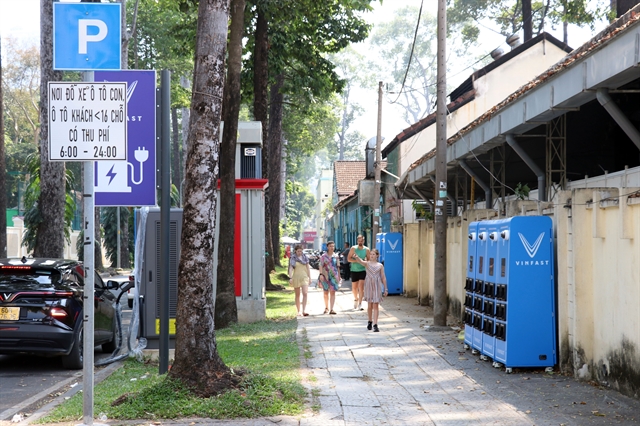 Society
Society

.jpg) |
| Lieutenant Colonel Nguyễn Văn Thịnh (second from right) teaches ethnic minority people in Mường Lát District during a literacy class. — Photo qdnd.vn |
THANH HÓA — Over the past 20 years, Forestry Engineer Lieutenant Colonel Nguyễn Văn Thịnh has helped ethnic minority communities in Mường Lát border district, Thanh Hóa Province, escape from poverty.
When he started working on the area in 2003, Thịnh said the district was then a barren land with severe weather condition, while farming methods depended heavily on nature.
Ethnic minority groups regularly suffered flash floods and landslides. As many as 79 per cent of households were classified as being poor, he said.
At first, Thịnh and his colleagues stayed at local houses to teach ethnic minority residents farming techniques, such as how to grow forest plants, vegetables, and rice, as well as educate them on hygiene and disease prevention.
“Most of villages did not have toilets. We encouraged residents to make toilets by themselves from bamboo,” he said.
“The villages had no roads, no electricity, no stations, no markets, no clean water. People bathed in streams.
“In a sparsely-populated area separated by mountains, communities lived far away from each other. It was difficult to persuade them to change farming methods,” he said.
Over 20 years, Thịnh and other soldiers constructed houses on the barren land and opened classes to teach ethnic communities modern farming techniques.
Thanks to his forestry knowledge, Thịnh carefully studied the soil conditions, climate, customs and habits of each ethnic group and each locality.
During the 2015-20 period, Thịnh gave consultations to Military Zone 4 to put into operation five villages’ cultural houses, a transformer station and a system of national grid at Pù Nhi Commune.
He also organised 15 literacy classes and built tens of kilometres of rural roads.
Thousands of seedlings were given to farmers to expand forest area.
Forest coverage has increased from 30 per cent to 46 per cent while the proportion of poor households decreased from 71.4 per cent in 2016 to nearly 48 per cent in 2021.
Hardships
As the villages are located in disadvantaged areas, Thịnh and his fellow soldiers experienced hardships during their work.
He remembered the days when the soldiers had to eat instant noodles and slept in raincoats on the ground or by the road.
Thịnh’s family live in Thanh Hóa City which is 300km from Mường Hóa District where he works. During 20 years, there were periods he did not visit his house for six months due to floods and blocked traffic.
Thanks to being close to the communities, now Thịnh can speak fluently three ethnic languages and understands every ethnic custom. But to him, the biggest reward is the respect of local residents. All of them regard Thịnh as a local villager.
Every time Thịnh returns to the villages where he worked, he is warmly welcomed like a child back home after being away for a long time.
Lộc Văn En, secretary of Party Committee of Na Hin Village, said thanks to Thịnh and other soldiers, the villagers were given seedlings for farming. The village’s farming area has been expanded to over 50ha.
Na Hin Village is the most remote village of Mường Lát District but has become the first village to be classified as the new rural-styled area of Mường Chanh Commune. — VNS